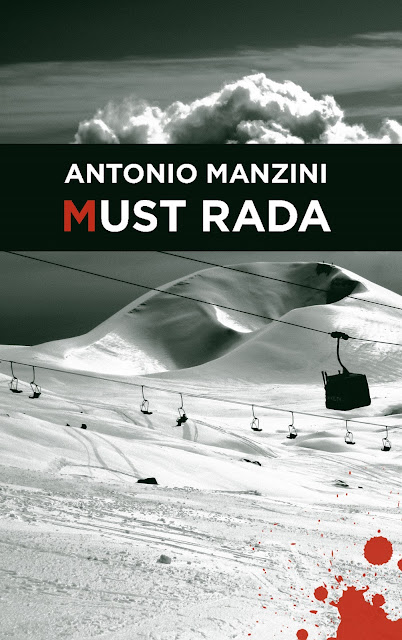 |
| Lugesin 29.-30. aprill 2022 |
Veel üks minu jaoks uus krimiautor. Seekord juba oskasin ette mõelda ning võtsin ette raamatu, mis peaks selle tegelasega sarjast esimene olema. Tegelikult on juba komissar - ups! - aseprefekt Rocco Schiavone nimi huvitav valik.
Meaning:Rest, repose. Rocco is a boy's name of Italian origin. It is thought to derive from the Old German word "hrok", which means to rest or repose. The name is associated with a fourteenth-century Catholic saint, San Rocco, who tended to the ill during a plague.
Pikem seletus: Rocco is an Italian name of Germanic origin derived from “hrok” meaning "rest". The name was borne by a famous early 14th century French saint, Saint Roch, or Rocco as he came to be known. Born to a barren mother who prayed to the Virgin Mary for a child, Rocco was holy from the start. In fact, it is said that he was born with a birthmark on his chest in the form of a red cross (which apparently grew larger as he grew older). Orphaned at 20, the devout Rocco distributed all of his earthly possessions among the poor and went on a pilgrimage to Rome where he ended up caring for the sick struck down by the Plague as it ravaged throughout Italy. It was said that he produced miraculous cures and recoveries through prayer and with the touch of his healing hand. Eventually he contracted the Plague himself, was expelled from the community, and retreated to the forest (where a nobleman and his dog tended to him). Eventually Rocco was arrested as a spy in Montpellier (his birthplace) on the orders of his own uncle (who didn’t recognize him). Nor did Rocco reveal who he was to save himself, so he died in prison a few years after his arrest. After his death, Rocco’s identity was divulged by virtue of his aforementioned birthmark; he was immediately venerated as a martyred saint. His cult grew in Italy in particular (given his dedication to the sick there) which is how this Germanic name became more identifiable as Italian. The popularity of his cult spread throughout Europe quickly in light of the Black Death (mid-14th century) and the need to call upon protective saints who purportedly cured the invalids and dying. As a result of this legend, Saint Rocco is considered the patron saint of the sick and plague-stricken. It’s interesting that the name comes from a word meaning "rest"; but perhaps that’s precisely what St. Rocco gave to his patients in their time of great suffering.
Ja perekonnanime kohta: The surname and its many variations - Schiavio, Lo Schiavo, Schiavinetti, Schiavuzzi, Schiavonato, Schiavulli - come from the words "slave" or "Slavonian"; since medieval times it was used not only for prisoners of war, slaves and serfs with no rights but also civilians (Slavs) originary of Eastern Europe. Also, during the 16th and 17th centuries in the Republic of Venice the Schiavoni were a special military corps. The surname may also derive, in Southern italy, from a village in the province of Reggio Calabria, Schiavone.
Rocco Schiavone on saadetud politseiuurijaks Põhja-Itaaliasse. Tema Roomast lahkumise põhjused pole laialdaselt teada, ent igal juhul pole ta sealt vabatahtlikult ära tulnud. Nüüd ootab ta, millal võiks saada kokku piisavalt raha, et peatselt siirduda kusagile soojema kliimaga kohta mõnusasti aega veetma, nii nagu tal koos abikaasa Marinaga sai plaanitud. Keeruliste juhtumite lahendamine ei tundu olevat Schiavone lemmiktegevus vaid tema mõõtkava järgi "ei midagi muud kui kümnenda astme jama".
Schiavone on oma alluvate suhtes pigem arrogantne, võimalike tunnistajate või küsitletavate suhtes ähvardav ning vilistab reeglitele kui ta leiab, et see on vajalik. Lemmikjalanõud Clarks'id jalas, läheb ta uurima mõrva, mis leidis aset suusamägede vahelisel metsateel. Hoolimata sellest, et pole mingeid selgeid vihjeid selle kohta, miks ja kuidas keegi tappis külalistemaja pidava Leone Miccichè, hakkab erinevat infot tasapisi siit-sealt välja kooruma. Nagu ikka siis, kui uurija käega ei löö ning järelejätmatult edasi rühib, kasvõi pisiasjadest vihjeid otsides. Sest sageli just need väiksed seigad viivadki lõpplahenduseni.
Huvitav komme on peategelase puhul tema harjumus inimesi liigitada vastavalt nende välisele sarnasusele ja olekule - teatud loomadeks. Näiteks oma sõpra Sebastianot näeb ta vastavalt - "Ursus arctos horribilis ehk grisli. Pehme, ilus ja suur loom, aga väga-väga ohtlik." Schiavone üks suur huvi on ka naised ning nii ei jää tema tähelepanekud ning mõtted tema teele sattuvate kaunite naiste puhul lugeja ees saladuseks. Aga siiski saame alles raamatu lõpus aimu, mis võiks olla Rocco Schiavone enda suur saladus...
Kommentaare ei ole:
Postita kommentaar